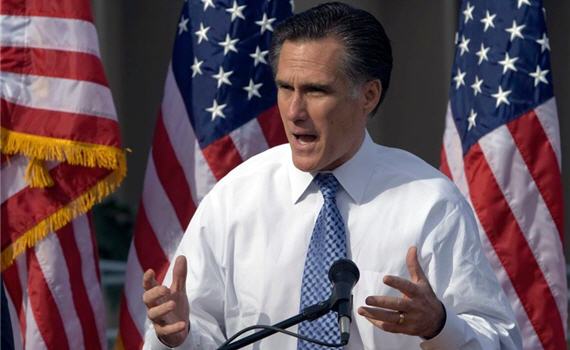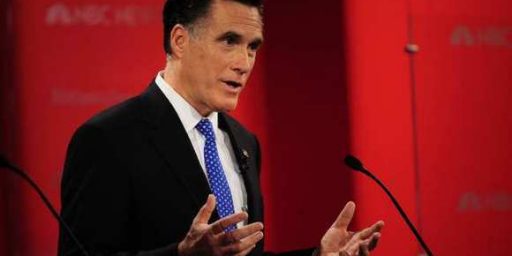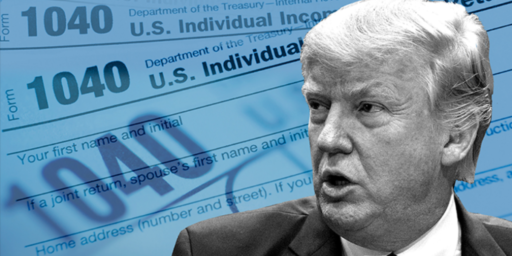Mitt Romney’s Unforced Tax Return Error
Mitt Romney has a bit of a tax return dilemma.
For much of the Presidential campaign, Mitt Romney has dodged the question of when, if ever, he was going to release his tax returns. Dodging the question hasn’t really worked out so well for him, though. There is no legal requirement that Presidential candidates release their tax returns, it has become customary for them to do so at some point during the campaign, so he had to know that the day would come when he’d have to release them. During Monday’s debate, Romney responded to a direct question from Rick Perry and Bret Baier, by saying he’d release his returns sometime in April.
If Romney thought that would be the end of the story, he was dreadfully wrong, though. The question followed him on the campaign trail, and unforunately for Romney, instead of telling the reporters that he’ll answer all questions when the returns are released, Romney decided to feed the media beast:
Under growing pressure from rival Republicans to release his tax returns, Mitt Romney said on Tuesday that he paid a tax rate approaching 15 percent on his millions of dollars in annual income but said he would not make public his full return until April.
His effective tax rate was “probably closer to the 15 percent rate than anything,” Mr. Romney said at a campaign stop in South Carolina, noting that most of his considerable income over the last decade has come from investments rather than from earned income like salary. He also characterized as “not very much” the $374,327 he reported earning in speaking fees last year, though that sum would, by itself, very nearly catapult most American families into the top 1 percent of the country’s earners.
Mr. Romney mentioned the 15 percent figure in response to a question at a news conference, leaving uncertain whether his comment was unplanned or a deliberate effort to begin airing the issue ahead of a general election campaign. But his remarks on Tuesday drew immediate criticism from the Obama administration and Republican rivals, and are likely to cement Mr. Romney’s place as an unwilling emblem of the intensifying national debate over taxation and income inequality, which burst into the campaign this month when rival candidates began attacking Mr. Romney’s career in the leveraged buyout business.
Mr. Romney’s admission left unclear — and his campaign declined to clarify — whether the 15 percent he was referring to represented his overall tax burden or simply his federal income taxes. That makes it hard to compare the figure with the tax burdens of a typical middle-class American — or of Mr. Romney’s opponents. President Obama reported paying an effective federal tax rate of 26 percent on his 2010 family income.
But in acknowledging that most of his income comes from investments, Mr. Romney underscored a fact likely to figure prominently in attacks from Mr. Obama and other Democrats in the coming months: He is among the small percentage of very wealthy Americans who have benefited enormously from shifts in federal tax policy that have pushed federal tax rates on investment income well below the top 35 percent rate for wages and salaries, which constitute most earnings for the vast majority of people.
“The low taxes on capital gains and dividends are why people who make a ton of money, which is largely from investment income, do awfully well,” said Robert McIntyre, the director of Citizens for Tax Justice, which advocates for more progressive taxation. “The Warren Buffetts, the hedge fund managers — they pay really low tax rates.”
Here’s where Romney made his mistake, I think. Talking about tax returns before the documents are released makes no sense whatsoever. One danger is that the candidate ends up saying something now that gets contradicted, even just slightly, by what’s in the documents. The other danger is that you then end up giving the media two stories, one being what you said about your income, the other being that he hasn’t released his tax returns. While Romney may want to wait until April to deal with this, the fact that the door was opened at the debate means that it will need to be dealt with sooner, which is why Chris Christie is right when he said this morning that Romney should release his returns as soon as possible, even if that means the 2011 return isn’t ready yet.
At the same press conference, Romney also characterized his sources of income in a manner that is likely to cause political issues for him in the future:
“What’s the effective rate I’ve been paying? It’s probably closer to the 15 percent rate than anything,” Romney, a GOP presidential candidate, said. “My last 10 years, I’ve — my income comes overwhelmingly from investments made in the past rather than ordinary income or rather than earned annual income. I got a little bit of income from my book, but I gave that all away. And then I get speaker’s fees from time to time, but not very much.”
As it turns out, Romney earned some $374,327.62 from speaking fees in 2010 and the early part of 2011 according to disclosures, earnings which alone place him near the top 1% of American taxpayers. There’s nothing wrong with this, of course, although I’m sure there are some will try to point to the mere fact that Romney made a lot of money on speaking fees as a sign of something wrong. The problem for Romney is in the way he characterized the amount as “not very much.” It’s clear that what Romney meant by this is that the amount he made from speaking fees was a relatively small portion of his overall income, but that’s not how it’s going to be characterized six months from now, as Philip Klein notes:
[S]tatements like this are just gold to President Obama, who hopes to make Romney a poster child for his class warfare reelection strategy. A comment like this, in the middle of January, isn’t likely to be on voters’ minds in November. But if Romney continues his pattern of making such statements, it will become a huge problem should he be the nominee.
Gingrich’s Republican opponents have already jumped on the issue, starting with Newt Gingrich who yesterday said that he could rename his proposal for a 15% flat tax “The Mitt Romney Flat Tax.” Of course, we can expect much worse from the Obama re-election campaign and the Democrats in the fall so perhaps, as Michael Shear suggests, it’s a good thing that this issue is coming out now rather than nine months from now:
Mr. Romney and his allies are also using this opportunity as a dry run of sorts — testing which responses work and which do not.
“It was sadly inevitable that the Obama campaign and the D.N.C. would demonize Governor Romney for succeeding in the private sector, abiding by the law, and seeking to keep taxes low for all Americans,” wrote Douglas Holtz-Eakin, an economic policy adviser for Senator John McCain in 2008, who is neutral this time. His article in National Review Online was titled: “It’s the Silly (Tax Policy) Season.”
Mr. Romney, too, will no doubt be better at answering these questions in nine months if he is the nominee.
If that is the case, he may look back on these past several weeks and remember them fondly as the time that he finally figured out how to confront the biggest attack on his economic credentials from President Obama.
Perhaps that’s true. There really isn’t anything that Romney can do about the fact that he’s wealthy, it’s a fact that voters will evaluate the importance of on their own and which those on the left will no doubt use to try to demonize him. One can argue that the should have been more prepared for attacks like this from fellow Republicans, and that’s true. However, as Shear notes perhaps this will end up being a good thing for Romney to the extent that it prepares him for the inevitable, relentless, and endless attacks from the left for the sin of being wealthy that are going to come his way starting just a few short months from now.







“I’m sure there are some will try to point to the mere fact that Romney made a lot of money on speaking fees as a sign of something wrong.”
Look! It’s a man made entirely out of straw! What an amazing sight!
“the inevitable, relentless, and endless attacks from the left for the sin of being wealthy”
Doug, what exactly is the ethical, economic or financial argument in favor of someone like Romney, who hasn’t been a businessman for several years but is just a guy sitting on a pile of money, paying a lower tax rate than teachers, hospice workers, firefighters or soldiers?
Mike
I guess I’m not very surprised by a 15% effective rate; he’s never appeared to be someone who has wages. I also gather the point about his income not being much is that with his tithing and charity, his income probably nets out to zero and that its really the investments that support him.
Also, strange to see so many commentors from the media who don’t appear to understand the difference between marginal tax rates and effective rates; that’s usually a conservative/Republican oversight.
They’d get less “push back” on raising the capital gains rates if they’d make Corporate Distributions tax deductible (to the Corporation) again. Then we could just treat all gains the same.
I agree that it is the trivialization of the speaking fees that will come back to bite him come the general election. That’s a very easy point to drive home in a “Mitt Romney is out of touch” attack ad.
“the sin of being wealthy and advocating policies which aid the wealthy at the expense of the rest of society”
FTFY.
There, that’s more accurate.
@MBunge:
These laws were made with C Corporations in mind. A C-Corp pays (up to) 35% tax before it gets to the share holder; to make the shareholder pay an extra 38% would be counter productive — C Corps already hold back most of their money for precisely this reason (leading to all sorts of troubles; q.v.). But LLCs (and their ilk) have gone big since then, and LLCs are typically taxed differently. Part of the reason they’ve gone big is because of tax considerations; another big part is liability/asset protection reasons.
(my emphasis)
I really expect better than this kind of boilerplate bullsh!t from you, Doug. Very few on the “Left”, and certainly no one who is taken seriously, will attack him for being rich. How much money he has is quite beside the point.
What is the point? Well actually 2 of them: #1- How he made his millions(by pillaging successful companies? By making sound investments and helping companies continue in a successful way? Depending on who is asking will decide the question)
and #2: How much he pays in taxes. If he pays 15% while making millions every year while I and so many others of the middle class pay a higher percentage, is that fair?(one can say yes, but they will look like a pretzel justifying it)
As to-
Yeah there is something wrong with that, but it is not his getting $41,000 per speech. What is wrong is the collective intelligence of people who will pay $41,000 to listen to a blow-hard like him lie. Hells bells, I want to meet these people. Maybe I can get $41,000 for making and hanging a door. It would still be a rip-off but at least then they would have a really nice door that was properly hung.
But hey, more power to the Mitt, he knows how to milk his suckers to the max. Good for him. I wish (sincerely) that I could do as well.
It’s also worth noting that Mitt said some months back that he thought the capital gains tax should be eliminated altogether. Combining that with this information means he basically thinks he and people like him should pay no income tax whatsoever. They just ought to be landed aristos, served by the common folk. How exactly do you think _that_ will play with the Tea Party and NASCAR crowds?
@MBunge:
The economic arguments in favor of lower tax rates for investment income are fairly well known and include the idea that lower rates on investment gains will encourage more investment, which is itself an economic good. You may disagree with those arguments, as you are entitled to. But that is the main argument that has won the day in Congress for decades now. Differential treatment of capital gains in the tax code is nearly as old as a tax code itself.
As for the ethical argument, it’s his property and that’s good enough for me. You may disagree.
When the government taxes wealthy people less it loses revenue, and when it loses revenue either the budget deficit increases or spending has to be cut or the middle class and the poor have to be taxed more. So voters have a choice to make. Is lowering taxes on the kind of income earned by the Romneys of this world so good for the economy or so preferable on moral grounds that it’s better than the alternatives?
To me, it isn’t. I’ve yet to see any convincing economic study showing that President Bush’s cuts in the capital gains tax rate have helped the economy in any significant way, and in a period of great and increasing inequality I see no moral justification for worsening the situation by giving cushy tax breaks to people who are already doing so well.
All this is relevant in Romney’s case because he’s proposing a tax plan that would cut taxes on people like him and raise them on the rest of the population. From what I’ve seen, Doug and some of the other proprietors of this blog like Romney’s ideas. I can’t understand their reasoning, and it doesn’t help when they talk about freedom.
@MBunge: Romney is basically receiving retirement income or deferred income, so comparing him with people who are working isn’t fair unless you want to go back to Romney’s income and tax treatment when he was working at Bain.
@Doug Mataconis:
Reference?
I’m pretty sure there are mostly political or philosophical arguments, which in turn make economic assertions.
What you’d need was a study that could somehow quantify “business investment” of all types, and then show that it changes reliably, in all conditions, with tax rate.
(I think capitals gains rates are too low, and even while low they aren’t causing the “business investment” we’d all like to see.)
@Doug Mataconis:
Yes on part A, not so much on part B. Before the banking deregulation in the 90s, “more investment” was pretty much defined by more factories -> more jobs -> better pay -> economic growth for all.
Now however, “more investment” means monetizing things (like CDOs, etc) that have no physical existence – trading pieces of paper for other pieces of paper, and producing nothing. Yes, factories are still being built, but at the very high end of the game – where Bain and Romney and _all_ hedge funds play – increasing investment literally removes money from the economy. It hurts us all to encourage their behavior.
@john personna:
You need a reference? Liberals have been attacking this concept since Reagan!
@legion:
Not to mention that a lower capital gains tax on houses surely fueled, at the margin, the housing bubble.
There are two levels of criticism to the idea that lower capital gains tax discourages “consumption” and encourages “investment.”
This first is, who says “investment” has more associated jobs or economic growth than “consumption?”
The second is, what if you encourage “investment” in a poor climate. Do you bear any responsibly for bubbles that result?
@John D’Geek:
:-), that’s why expressly asked for an economic reference, with respect to growth.
IIRC, most studies of capital gains tax rates only look at short-term follow-on capital gains receipts. Not exactly the same.
Here’s some economic data.
Real investment has been growing at a steady pace since WWII. Dramatic slashes to the capital gains tax rate DID NOT produce a drastic increase in investment.
@OzarkHillbilly:
Not only that, but Mitt is also didn’t have exactly the same starting point as most americans do…
@john personna:
Why, people whose entire fortunes are tied up in “investments”, silly!
@John D’Geek:
He’s asking for a reference that reduced rates on capital gains encourage business investment. And that that is a desirable economic outcome. Does he have the research to back up those claims?
@legion:
This is worth focusing on. I think it reduces to this:
Anyone who believes in free markets would treat consumption and investment equally.
Or to put it in micro-perspective, I was watching Amerca’s new guilty pleasure, Storage Wars, and saw Dave make a killing on some vending machines. He said, “You know what this means? My son and I go to Alaska for salmon and halibut fishing!” Not business investment? Well, money flows to businesses and workers either way. Someone has fishing gear and outdoor clothing for sale. Some guide needs guests. Some lodge needs to amortize its investment.
No doubt the American left would prefer the windfall go to increased wages for Dave’s workers, but as a growth argument, it doesn’t really matter. Either is good, paying Dave’s workers or Dave’s fishing guide.
The only way Dave could break the cycle would be to say “You know what this means? I get to dig a hole and bury this in my back yard!”
If you believe, as I do, that the sole purpose of the tax code should be to raise revenue then yes this is true. Unfortunately, both Democrats and Republicans have long abandoned that idea and now look at the Internal Revenue Code as a means to pass along benefits to favored population groups or industries. That is why we have so many exemptions, deductions, credits, etc. And it’s why investment and “earned” income are treated differently.
Damn you are boring.
@john personna: Bingo. I have often noticed that the things that are described in microeconomics as “bad” for any economy (high barriers to entry, monopoly control, etc) are things any individual business would _love_ to see (if it only benefited them). So when businesses are allowed to write legislation, it shouldn’t surprise _anyone_ that the laws they make/buy have the effect of destroying the national economy.
@ Doug…
This is true. Except Reagan did, and the Simpson Bowles Act would have, eliminated the Capital Gains tax break altogether…so it’s hardly sacrosanct…but no matter.
The problem is that hedge fund guys, and guys like Romney, are using the carried interest loophole in order to shelter income that is not actually Capital Gains. Yes, it is perfectly legal. But Romney and I pay about the same effective tax rate. So while it’s legal it’s not right, it’s not smart, and it’s not at all productive.
As for your charachteristically childish attack line:
I do not care about how much money anyone makes…I took 3 years off and a 50% paycut to pursue a second career…so trust me when I say money means little to me. What does matter is a system that is gamed to benefit a small group of people, and a candidate like Romney who is at once a member of that small group and intent on preserving and extending the benefits enjoyed by that same small group…on the backs of the poor, the sick, the elderly, and the middle class. Why does that matter? Because as we have seen for the last 30 years it does not advance the economic well being of the nation…it is in fact tremendously counter-productive.
“sin of being wealthy” i.e. the Left hates rich people is Church of Fox dogma.
I don’t think Mr. Romney has done anything immoral or illegal – in fact, he’s done what pretty much most folks would have done if they found themselves in a similar situation.
My guess is that there is yet another rather large brick yet to drop here. I would be truly shocked if Mr. Romney’s tax attorneys haven’t done their job and designed a tax strategy that has resulted in Mr. Romney paying far, far less than 15%.
Again, nothing immoral etc here. But should Mr. Romney’s actual tax rate be in single digits – or even zero – it’s going to make the whole “class warfare” dogma awfully tough to pull off, even with low-information voters.
Sometimes you just can’t help it, can you?
Hate to say it, but I don’t see “endless attacks from the left for the sin of being wealthy” headed towards Obama, himself a wealthy man, too much. Maybe it’s because the left is composed entirely of hypocrites. Or maybe it’s because they’re not as demagogic about wealth as you think they are…
As I said on James’ thread on this subject, I’m starting to wonder if his personal wealth is one topic that Romney has ruled off-limits for his campaign staff to talk about with him – that’s it’s too personal for people to give him advice about. I don’t know but it’s hard to reconcile his tin ear for his personal money with the otherwise smoothly running of his campaign.
Another point: a few days ago I talked about the public’s view of capitalism and the bigger-picture, macro view of capitalism. In the bigger-picture view, Romney’s wealth makes sense and is how the system works. But to the public, raised on work-hard-and-you’ll-get-ahead principles, it’s hard to imagine how someone can make that much money just for talking at a podium rather than actually building something that people buy. A lot of the recent Jobs gush was centred around: “look he actually created stuff!!!!!” As if it was rare enough these days to warrant comment.
Speakers fees are close to the top in terms of ultimate insider revenue sharing. Paradoxically, it’s Gingrich’s career that best reflects that, not Romney’s.
Lots of comments to the effect that “tax rates don’t matter.”. One even cited low cap gains rates as the housing bubble initiator. Let’s leave bill Clinton’s policies aside for a second.
Envy and class warfare seem to be the flavor of the day. Remember the “millionaires yacht tax”. Boy very class warrior was going to stick it to the rich. It killed the boating industry for quite some time. Who got hosed? The boating workers. The little guy. Careful what your envy driven policies might reap you malcontents….
Well, go talk to Rick Perry and Newt. They are the ones that are pushing it.
@Drew:
Did you see the “investment versus capital gains tax” chart?
Again, it doesn’t show lowered tax spurring more investment.
And of course, I’m on the side of the yacht sailors, brokers, washers, etc. Consumption is fine.
I do believe the OTB comments section is inevitably approaching the old NY Times “sewer” blog……
@Drew:
I guess that’s a variation on the old lawyer’s rule “If neither the facts nor the law are on your side, pound the table.”
In this case, “if the data are against you, insult your audience.”